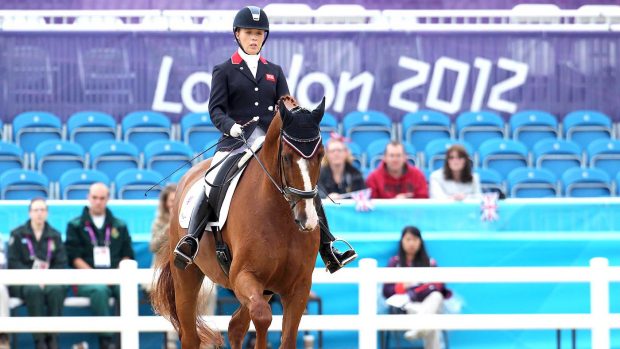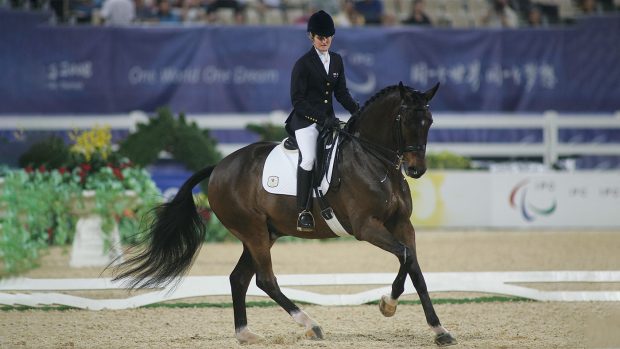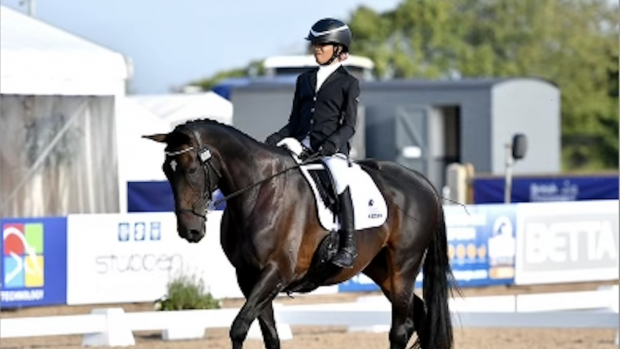“Love has to prevail” – Sir Lee Pearson’s words have been at the forefront of my mind since his moving comments on acceptance and hope for a better world, following the first of his three gold dressage medals at the Tokyo Paralympics.
The Games is a wonderful contradiction of being totally and completely about sport, while also being so much greater than that it almost ceases to be about sport at all. That’s perhaps a little over generalising. To put it another way, sport is the focus, but the Games – both Olympics and Paralympics – are about people, their stories and human (and equine) achievement.
When the world’s media descends on a venue, they don’t come to hear a list of statistics or numbers. They come for the story. And so Lee told his – sharing as he did a message of love and acceptance – and each of the others behind him told theirs. Remarkable stories of journeys covering thousands of miles, sacrifices made, and putting into words what it meant to be at the Games.
Yes, there were fabulous scores and medal tallies and records set. But as a human, it is the stories that will stick with me long after I’ve forgotten the percentages.
Words seem so small by comparison of the enormity of it all. I’ve hammered out 20,000+ in the last week, trying to find the right ones in the right order to breathe life into these stories, these emotions. It is a privilege as a journalist when people choose to share and trust their stories with me, and not one I ever take for granted.
Love, actually
There’s nowhere quite like a mixed zone. This is where riders come to chat to the press moments after their test, while the competition continues to play out behind them. The energy is constantly shifting with raw emotion.
Journalists have all kinds of briefs, roughly grouped into: sport-specific, medal chasers, unusual story finders, flash quote generators and those keeping track of the big stars. When they all descend together, the atmosphere is electric.
It’s from here that I saw Don Cara M spooking sharply in the 10 minute box, followed by Sophie Wells’ palpable relief some 15 minutes later after “surviving” the team test. She had no idea at that point how much more she had done than survive, and that her score had secured team gold.
It was here too that I spoke to Belgium’s Manon Claeys, composed but disappointed after believing she had finished fourth in the freestyle. As she turned to see the final result, she let out a scream as she saw she had clinched bronze – her second of the Games – while the Belgian attaché and fellow competitors gave her a guard of honour.
But for all the pressure of the competition, the years spent dedicated to training and the drive to win, it was love that came across in all the interviews. Love for their horse, the sport and the people around them.
Even when things went wrong, that love never faltered.
Ireland’s Michael Murphy, tipped as an individual medal contender, had the devastation of his rein catch snapping moments into his individual test. He was left without a rein, unable to turn right, costing him both his individual result and a place in the freestyle. As Michael ended the test, he could be seen whispering “good boy” to his horse. “I’m very lucky I’m on Cleverboy because the way he looked after me in there yesterday was amazing,” he quipped, after redemption with a beautiful performance in the team test.
For French rider Celine Gurney, who didn’t hear the bell and was eliminated in the individual competition for entering the arena too late, the frustration and disappointment must have been immense. Like Michael, she too came out again on Saturday to produce a solid test for the team and spoke of her happiness for the horse and the result for the team.
And it was love and sportsmanship that flowed from Dutch rider Sanne Voets in the moments after believing she had done enough to secure team gold, only to learn Sophie’s score had been revised upwards and the Netherlands would take team silver by 0.656%.
“We would love to win the team gold, but if you perform at your very best with the three of you, you shouldn’t be disappointed with silver. We have won a beautiful medal,” said Sanne, praising her horse before being the first to congratulate the Brits on their victory.
The genuine astonishment on the Brits’ faces as their talented, yet untested, rides shone brighter each day, with their pride in and love for their horses choking in their voices. Hearing Philippa Johnson-Dwyer speak about the power of “ubuntu” and how her loving her horse was at the core of their bond, given she was unable to ride for much of the last year after undergoing open heart surgery and chemotherapy. Seeing Georgia Wilson take her place among the Paralympic greats as she beamed with delight, and her smile reflected in the tears pouring down the cheeks of her proud coach and mentor Sophie Wells. As a reporter, I’m lucky to live these experiences several times over – witnessing them first hand, then feeling the emotion of them again as I try to immortalise them in ink.
My final copy deadline of 4am, after the nearing-midnight medal ceremony, meant there was no time for sleep (even had I been able to) before my morning flight. Some 30-odd hours of being awake with too much adrenaline to shut my eyes, I found Black Beauty on the in-flight films (yes, I’m aware I am a walking cliché). I simply had not thought this through. It took all of the first two notes of the opening strings melody and the delayed onset of processing everything that had happened – and that it was now over – brought a wave of emotion over me that I wasn’t really prepared for or expecting.
I don’t cry easily, but there didn’t seem to be an off switch. So here I was, sat in a tin can in the sky with nothing but my own thoughts to process with the most heart-breaking, if on-brand, film for company. Thank god I was travelling solo. I promise I am a lot more fun at parties…
Eyes of the world
The magnitude of the Paralympics is also a reminder of how sport does not exist in a bubble. Belgium bombing survivor Beatrice de Lavalette making her Games debut for the US, the pandemic measures and the announcement of the Afghan team’s arrival (athletics and taekwondo) acted as reminders that the events we see on the news are not things that happens to other people.
The word “platform” sounds so corporate and clinical for the shimmering ball of life that is the Paralympic movement, drawing the world’s gaze like a magnet. “Stage” similarly, a word journalists use when they can’t think of another (I’m absolutely guilty of that). Whatever you want to call it, the eyes of the world means the Games are a place where messages are heard.
Lee’s message of love and acceptance to those facing inward or outward battles with disability and sexuality, followed by Natasha Baker’s call for an end to disability discrimination and highlighting how damaging ableism is, are to name just two examples of this. Taking sport off the back pages and into the news pages.
Both riders also made a loud plea to UK show organisers to take responsibility and schedule para sport in their programmes.
“We need to be at more able-bodied shows. We need to be more inclusive, we want that recognition. We want to be out there; they can’t be scared of us para dressage riders. We want to be put into these bigger atmospheres,” said Natasha.
Sophie used that visibility to shout about the power of the horse/human relationship in the hope that by raising awareness, more people will have the chance to feel that magic. It’s also interesting to note that Sophie was talent spotted for para sport at an able-bodied talent spotting day. In a pre-Tokyo interview on the H&H podcast, Sophie told me that before then, she hadn’t really been aware of what para dressage was.
That moment was a long time ago now, and the continued British success is testament in large part to the systems the sport has in place in this country to find and nurture talent. But how many more Sophies are out there across the world with the raw talent to succeed, but who just aren’t aware what para dressage is all about?
It comes back to Natasha’s point about why para sport needs to be at major shows, and also why the live-streaming Paralympic dressage for the first time this year was such a big deal.
The same goes for horses – Don Cara M’s career in able-bodied dressage was limited as he can’t do flying changes. His switch to para, where flying changes are not required, means that he has gone from a horse that had hit his ceiling at medium, to a horse that is at the very top of his game. When horsepower is 50% of the picture in equestrian sport, it flips that same question as to how many other Don Cara Ms are out there whose owners just aren’t aware of what their horse could achieve?
The echoing empty stands were also a deafening reminder of what’s happening in the outside world. My heart broke for Japan for the Games that might have been – as side-saddle rider Barbara Minneci so elegantly put, “this would have been the most beautiful Games ever”.
While it may not have been the Games Japan had planned, there was no doubting the beauty in the Games that it held.
You might also be interested in:

H&H Olympic reporter’s blog: ‘My emotions have been on hold – but these are our people, contributing to Team GB’

Ricky Balshaw on Tokyo Paralympics: ‘I’m so happy to have been wrong’

Three British freestyle medals including Sir Lee Pearson’s phenomenal 14th Paralympic gold: catch up on Tokyo’s final dressage day

Subscribe to Horse & Hound this spring for great savings
Horse & Hound magazine, out every Thursday, is packed with all the latest news and reports, as well as interviews, specials, nostalgia, vet and training advice. Find how you can enjoy the magazine delivered to your door every week, plus options to upgrade your subscription to access our online service that brings you breaking news and reports as well as other benefits.




